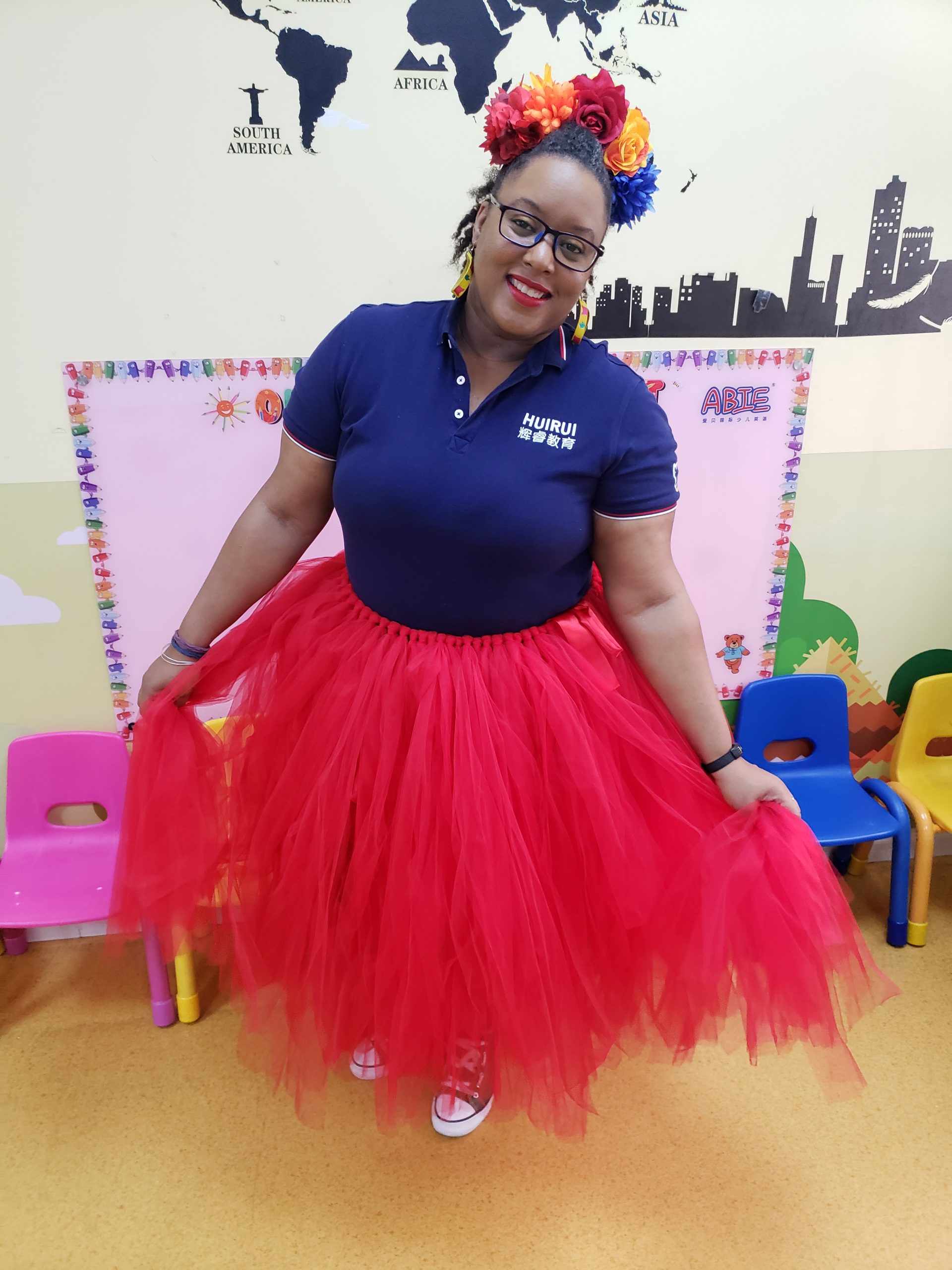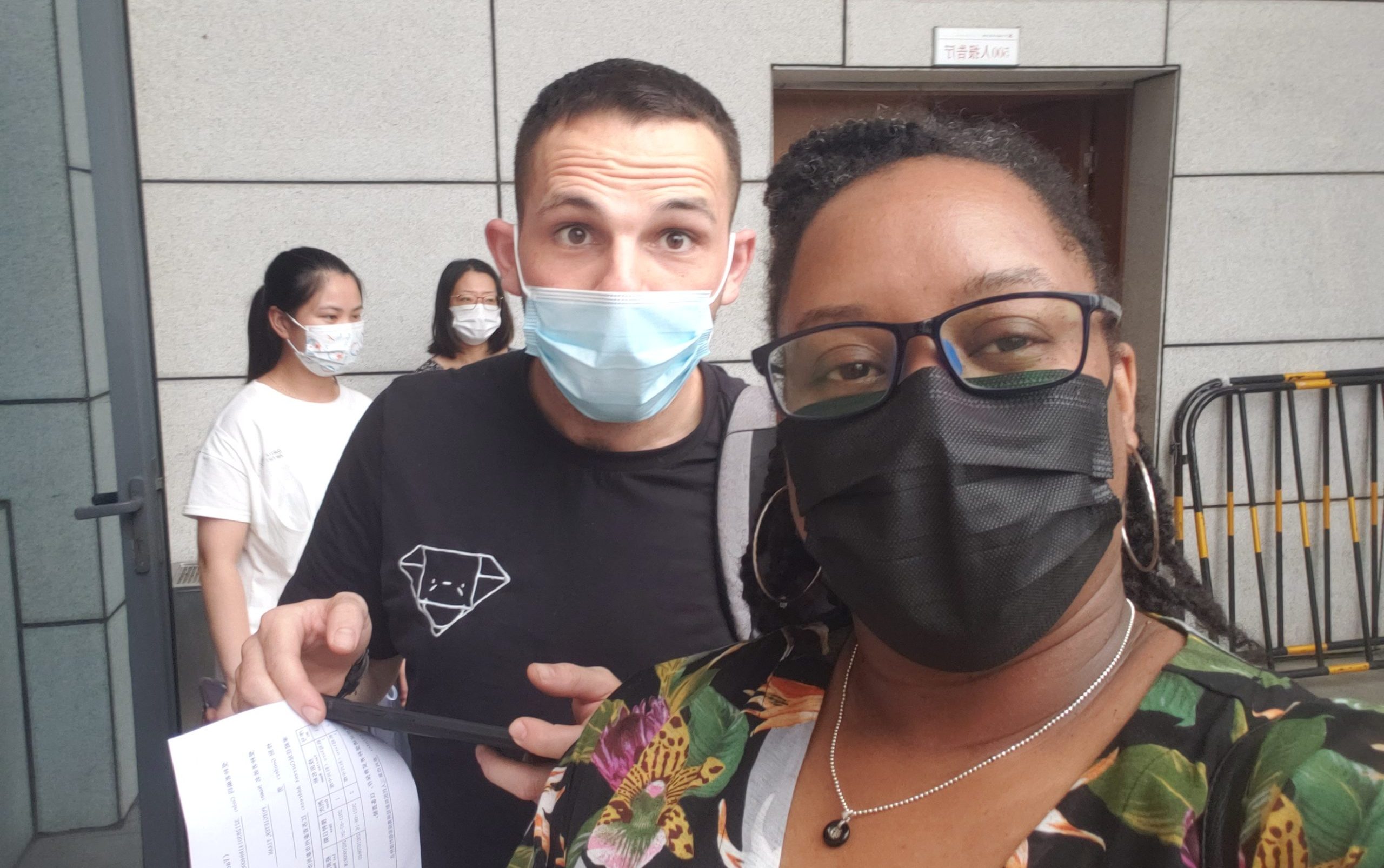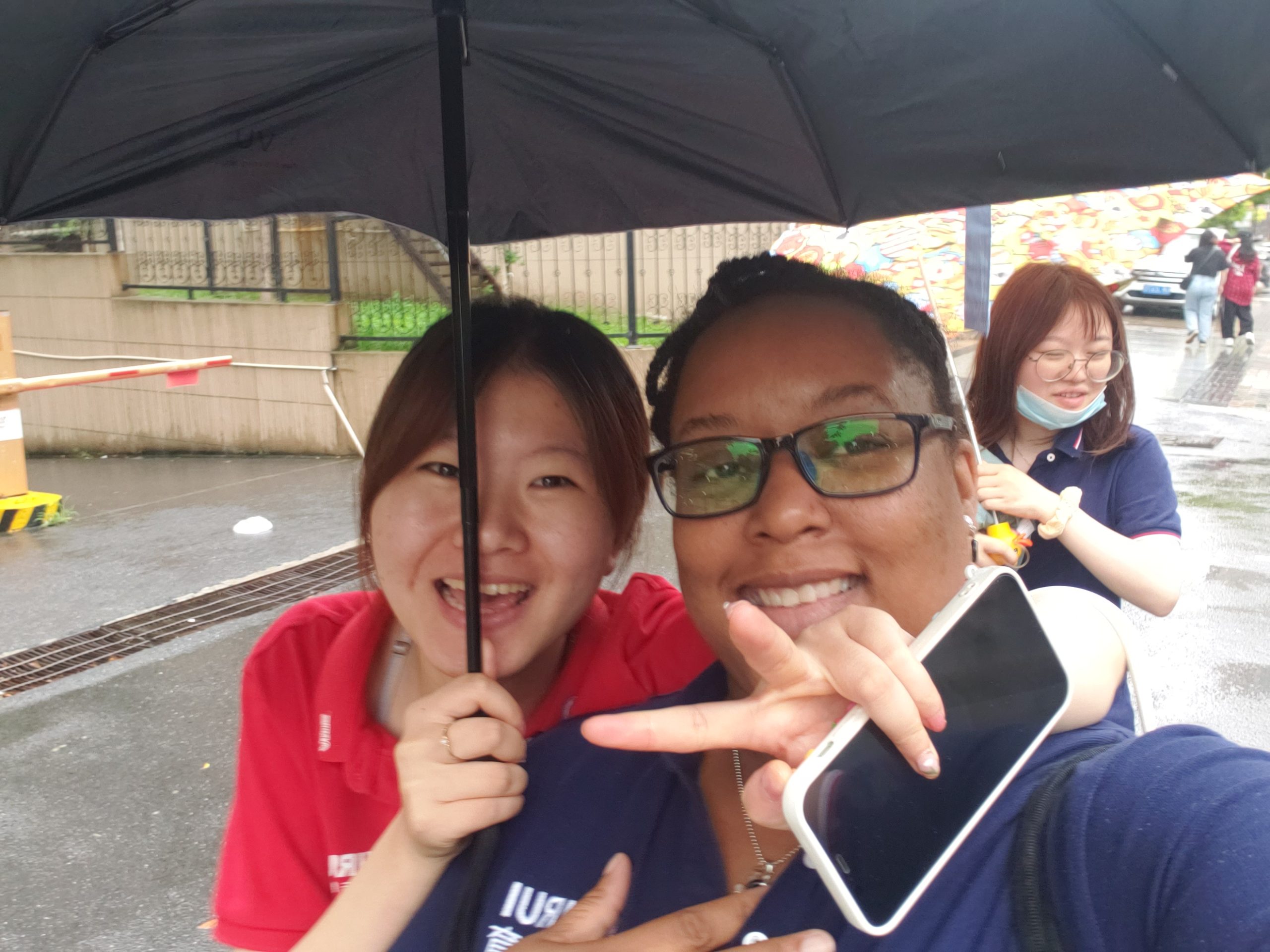Abeo Lewis is from the wonderful Trinidad and Tobago and has been living in Shanghai, to fulfill her dream to teach in China. We caught up with her to hear about the challenges she has faced and her experiences of living in China throughout the coronavirus pandemic.
Hello Abeo! Tell us more about you before you decided to teach in China. What’s your background?
I’m from Trinidad and Tobago, a small twin-island country with a population of around 1.3 million people. We are vibrant, fun-loving, and creative people. Our Carnival, which is my favorite season after Christmas, is one of the biggest in the world. It attracts visitors from every corner of the globe. I’ve always wanted to travel more and experience other cultures.
I am a certified event planner with a strong background in customer service management. I am also an avid crafter and I love working with leather to create unique bags and accessories. For the last 8 years, I have also been a volunteer adult literacy tutor with Alta. This is where my passion for teaching really flourished. It’s a beautiful thing to help someone cross learning hurdles and accomplish their goals, as small as they may be.

You’re a solo female traveler currently in Shanghai. Tell us about your unique journey to teach in China?
I have always been an adventurer. I have a lot of encouragement from my inner circle, because of the opportunities that were being presented. So with a prayer, and a somewhat light suitcase, I set off on a journey that took me to the other side of the world. I went through 5 airports, and flew for 24 hours to get to Shanghai over the course of 2 days. It was tiring but I met some cool people along the way. Thanks to free airport WiFi and a VPN (virtual private network), I was able to stay in contact with my family.
Our readers will be keen to hear firsthand about Abeo’s experience of living in China through the Coronavirus outbreak.
When the virus first hit, I thought it was simply a few isolated incidents in Wuhan. We were still going out as normal on bus-hopping Sundays to explore Shanghai. We were already using masks because of the air quality on some days, so it wasn’t anything new. Now we wear them all the time in public. By the time mid-January came around, it was more serious. We limited our outings to the grocery store and market, even though Shanghai didn’t have a lot of cases by then.
Being West Indian meant that certain cultural practices helped me navigate this time easier. We rarely wore our shoes inside, they were taken off at the door and we put on slippers. This is something the Chinese practice as well. We never sit on our beds with the clothes we wore while on buses or the train.
When it became clearer about how long the virus lived on surfaces, it was almost already second nature to us to avoid those instances where the spread could have occurred. We just cleaned the doors and floors twice or maybe three times a week. Our apartment complex played a big role in avoiding the spread of the virus in our compound. The elevators were cleaned regularly and disinfected, the garbage was removed promptly and our temperatures were checked when we got back from being out. When we resumed work at the office we were checked there as well.
What are some challenges that you have faced and how have you overcome them? What have you learned?
The biggest challenge in the first few weeks was getting information. Everyone was sharing what they heard, not what was factual. The second challenge immediately became getting masks. Because it was Chinese New Year, factories had closed off deliveries the week before. The third challenge was getting groceries. Not because there was a shortage, but more so when we ordered online, there were a large number of orders and limited staff. So things took about eight days to get to me. The mini-mart closest to us reopened the week after Chinese New Year, so we were able to get anything we needed and they restocked regularly.
The quiet time, being at home, and not being able to go out as we were accustomed, meant we had to get creative to not be bored. Chatting with friends back home, looking at the Carnival festivities that happened in February, really helped. There was a lot of time for sleep and reflection as well. Thankfully, two months later Shanghai is coming alive again, the deliveries are happening, more people are outside and the life of the city is coming out as spring hits and the weather is changing.
The biggest lesson in all of this is that we really have to work together and do our part to limit the spread and recover as quickly as possible. It’s a scary time but trust that the sun comes out again and life will continue.

What advice do you have for individuals considering a move to teach in China?
Don’t doubt yourself. I have no regrets about this journey. As a friend of mine once said, “no one likes a boring biography”. Prepare yourself and leave all pre-existing notions behind. They will only limit your ability to experience the fullness of Chinese culture and people and even cause you more teething problems than are necessary. It’s a huge country that feels so small and well connected. Download a good translator application, learn a few words in Mandarin and prepare for the adventure of a lifetime.
Abeo, can you share with us a favorite story or two from your time in China so far?
I arrived in Shanghai late in November, so my adventures were limited before the pandemic hit. However, my first trip to a Chinese grocery was a definite eye-opener. We had walked around and picked up the things that I needed and just left the vegetable and fruit section when I suddenly shouted “wow they have live stuff in the grocery”. Never in my life had I seen the option to buy fresh fish, crab, and oysters that were still alive and swimming in tanks. I am accustomed to seeing live animals at the fresh market, but never within a “regular” grocery building. My roommate had a good laugh at my expense.
You’re about to embark on your Level 5 TEFL course. What words of encouragement do you have for individuals considering getting a TEFL certificate?
I did a lot of research, and I was very comfortable and confident in the years of experience that Premier TEFL has, the online support I received when I had a million questions that needed answering. Sarah was almost always available to answer questions and when she wasn’t, Rosie even answered from home late on a Saturday evening just so I wouldn’t have to wait all weekend for a reply. Examine your needs carefully, there are options for everyone here. I chose a Level 5 TEFL course because I think it will stand out more on my resume. The price is affordable as well.
What are two interesting things about China that the average person wouldn’t know?
Two things that I was not prepared for:
- Your phone becomes your life here. Almost everything is done through your phone; paying bills, buying groceries, ordering food, ordering a taxi or buying things on Taobao (like Amazon but bigger). WeChat is an all-in-one application that includes communication, banking, and social media.
- Even though you may not speak Chinese, people will speak to you as if you can. It’s cute and it’s also why you should learn a few words or have a solid translator. It’s appreciated when you try to communicate and it really helps you get through daily life.
What are your career plans once you gain your TEFL qualification?
I am hoping that I can teach English in China, though not necessarily in a school. I like teaching adults, so I am focusing on business English and online teaching.

How can readers follow your adventures abroad on social networks?
I have actually just started my blog and I am making it my mission to post weekly. I may add other platforms later on. Expect lots of nature, dogs and people pictures!
Six months later we caught up with Abeo to see if she is still living in China… SPOILER ALERT: She is! Keep reading to find out what Abeo has been doing since we last spoke…
Abeo! You’re STILL in China. Tell us some of your highlights from the past 12 months since we first met you.
Yes I am still here! I have fallen more in love with China and all the friends and experiences that I have had so far! I currently live in a small city called Taixing, in Jiangsu Province. It’s convenient and not as exciting as the bigger cities, but it has a unique charm and comfort that reminds me of my home country. (Also the population is the same as Trinidad and Tobago).
Talk us through your teaching experience so far. Who do you teach in China and what is your schedule like? Were you teaching online, in-class, or a hybrid approach over the past year?
I work at a Training Centre, so it’s primarily been classes on afternoons and on weekends. The government recently made some changes so all centers are adjusting, but our focus remains on the kids. I teach kids between the ages of 3 and 11. They are brilliant kids and bring joy to my day! We teach through games, songs, and standard teaching practices. We have mainly been in class, but we had a small outbreak in the province in July and we were online for a bit. We are back in class now!
You started out teaching at a training center in Shanghai; have you moved schools or locations? Tell us about that.
Actually, I started teaching at the center in Taixing, and at the end of this year, I will begin a new adventure and teach in China at a regular school, so it means adjusting my work times, sleep times but there are so many opportunities and challenges that I look forward to. I’ll gain more experience and become a better teacher. It will also mean moving to a bigger city (more things to explore) but it won’t be as big as Shanghai.
You were one of our most inspiring graduates of 2020 making the move to China and staying throughout the pandemic. What advice do you have for budding teachers who want to teach abroad ASAP?
My first bit of advice: GET A PREMIER TEFL Certificate. Then get it authenticated by the Chinese Embassy. Then make a plan, reach out to people who are already on the ground in China. Do your research and think about what kind of teacher you want to be? Do you genuinely love teaching or is this about the job and the perks? Be honest with yourself and then prepare for an adventure of a lifetime! Your attitude and preparation determine the experience you will have. You have a chance to be the version of yourself that you have longed to be!
How has completing a Level 5 Government Regulated TEFL qualification helped your teaching career?
This is a fundamental component to getting a job in China, as a new teacher. Without my Level 5 Government Regulated TEFL course, I would not have been as gainfully employed as I am now. It also makes you stand out from other TEFL teachers as Premier’s reputation is top-notch.
Can you share some insider tips with our readers about life in China? Try to think of things you wouldn’t know from a guidebook, you’ve discovered through local knowledge.
Be open to experiences, don’t be too close-minded, and remember to make the best of it. The pandemic has really put a lot of people on edge worldwide, but again, your attitude will affect your experience. There’s a little of everything for everyone. I have found so many cultural similarities between Chinese and Caribbean cultures. You can learn so much from locals, and generally, they are helpful and very curious. Another tip is to learn a little Chinese. Some basic phrases will go a long way in helping you communicate your needs. Teenagers are generally shy but many young adults, 18 to 25 know a bit of English and can help.
Tell us how you have been able to build up your social circle while you teach in China? If you faced any challenges, how did you overcome them?
My Embassy has a group for nationals so we usually add the other nationals in our city to our Wechat (a very important multifunctional app for communication) and we have meetups and chat often. It’s a great comfort to be able to communicate and spend time with people who have a similar cultural background. I also made more friends through other friends, dating apps, work, and random encounters.

Have you been able to explore other parts of China yet? If so, where and what were your favorite things to see/do?
I have been to a couple of other cities that were easily reachable by taxi, bus, and train. My work schedule was a bit hectic, so I hope to explore more when I transition to my new job. I’ve explored Wuxi, Nantong, Suzhou (my favorite), and I have revisited Shanghai to see friends and have some fun! I also have a list of others that I will visit soon including Nanjing, Guangzhou, and Shenzhen. I hope to visit Japan and South Korea during vacation time next year.
How is your blog going? Are you posting on social media while you teach in China?
I am still working on that. I haven’t had a lot of time to post on social media. I have recently embraced photography as my new hobby, and I am working on how best I can showcase the pictures and tell the story of my adventures in China! But stay tuned, a blog and Instagram page are in the works!
Thank you, Abeo, for taking the time to share your incredible story in China with the Premier TEFL community. We are excited to follow your blog updates! If you want to read more about TEFL teachers traveling, check out our interview with teacher and Premier TEFL alumni Vanessa. Vanessa went to Ireland for one week and was stuck there for four months because of COVID-19!
The post Can You Teach in China? Interview with Abeo Lewis appeared first on Premier TEFL.





